The Importance of Preventing Food Loss and Waste
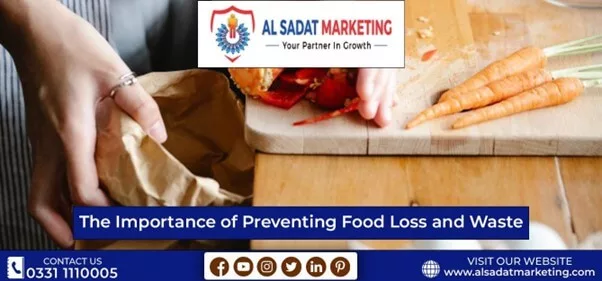
Around 1.3 billion tonnes or about one-third of all food produced for human use worldwide are lost or wasted annually. Covid-19 has exposed vulnerabilities in our food systems and heightened the need to remedy food loss and waste (FLW), both locally and globally.
Reducing food loss and waste is a powerful means to strengthen the sustainability of our food systems and improve planetary health. How does food waste affect the environment? It turns out to be quite a bit.
Food waste in landfills generates methane, a potent greenhouse gas that contributes to climate change. Keeping food waste out of landfills is one way to help the environment.
International Day of Awareness on Food Loss and Waste
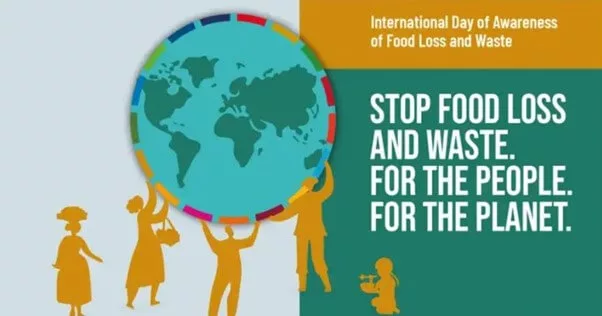
September 29 is the International Day of Awareness of Food Loss and Waste, an opportunity to raise awareness of practices and innovations to reduce food loss and waste and build a more resilient food system. The United Nations Food and Agriculture Organization (FAO) delivered six key messages highlighting areas to catalyze change towards reduced food loss and waste. Here are some of the messages:
- Investments in innovation, technologies, and infrastructure are necessary to improve the effectiveness of our food systems and decrease food loss and waste.
- Food waste is avoided, surplus food is not wasted, and there are economic, environmental, and social benefits from recovering and distributing surplus food.
- Composting food waste is better than sending it to a landfill but eliminating food waste in the first place is an even better approach to decrease the impact on the environment.
- Realizing and maximizing the positive consequences of minimizing food loss and waste, involves excellent governance and human capital development, as well as collaboration and partnerships.
Ultimately, the only way to guarantee that we create a sustainable and resilient food system with no room for food waste is to translate these messages into local and international policies and practices.
The Importance of Preventing Food Loss and Waste
Excluding the retail stage of the supply chain, around 14% of the world’s food is lost after harvest, and an estimated 17% is wasted at the retail and consumption levels. This food loss and waste contribute to an unstable climate and catastrophic weather events like droughts and flooding by making up 8 to 10% of all global greenhouse gases emissions. Crop yields are negatively impacted, crop nutrition is decreased, the supply chain is disrupted, and food security and nutrition are threatened by these changes.
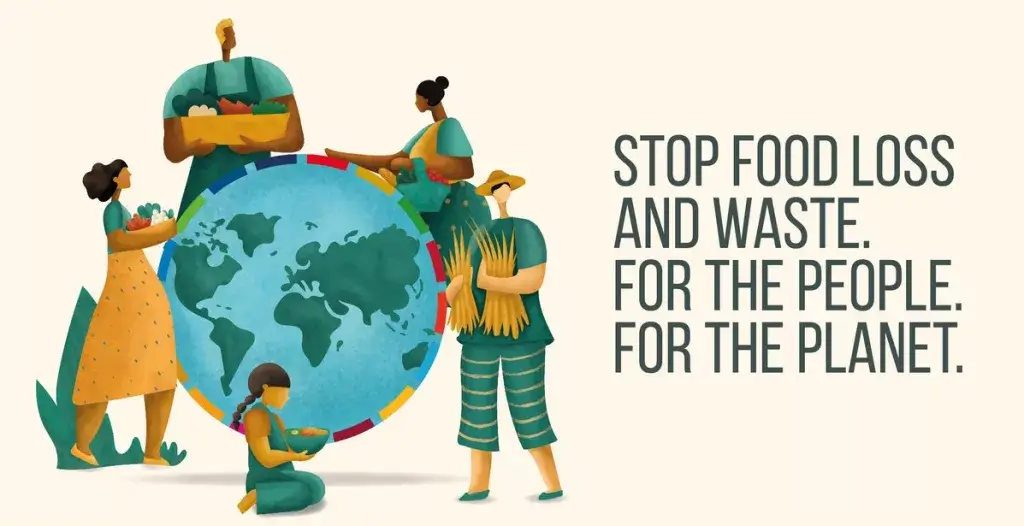
The 2030 Agenda for Sustainable Development, in particular SDG 12, objective 12.3, asks for minimizing food losses along the production and supply chains and halving global per capita food waste at the retail and consumer levels.
Around 828 million people in the globe go hungry, while an estimated 3.1 billion people lack access to balanced food. All of this indicates that reducing food loss and waste must be done quickly.
There is no way to overstate how urgent it is to step up efforts to reduce food loss and waste with eight years left to accomplish the goal. In addition to enhancing the overall sustainability of our food systems, reducing food loss and waste offers the chance for immediate climate benefits. This transition is important to secure better planetary and nutritional results for both the present and future generations.
We should prevent food loss and waste because:
- Safe and clean food that goes wasted every year can help thousands of hungry people and families in need of food.
- Preventing food loss can save a lot of money.
- Food waste also includes the wastage of the land, water, labour, energy, and other resources used in its production, processing, transportation, preparation, storage, and disposal. So preventing food loss can also help in utilizing resources for productive use.
- Avoiding food loss can help landfills lower the greenhouse gases produced by rotten food and this in turn will mitigate climate change.
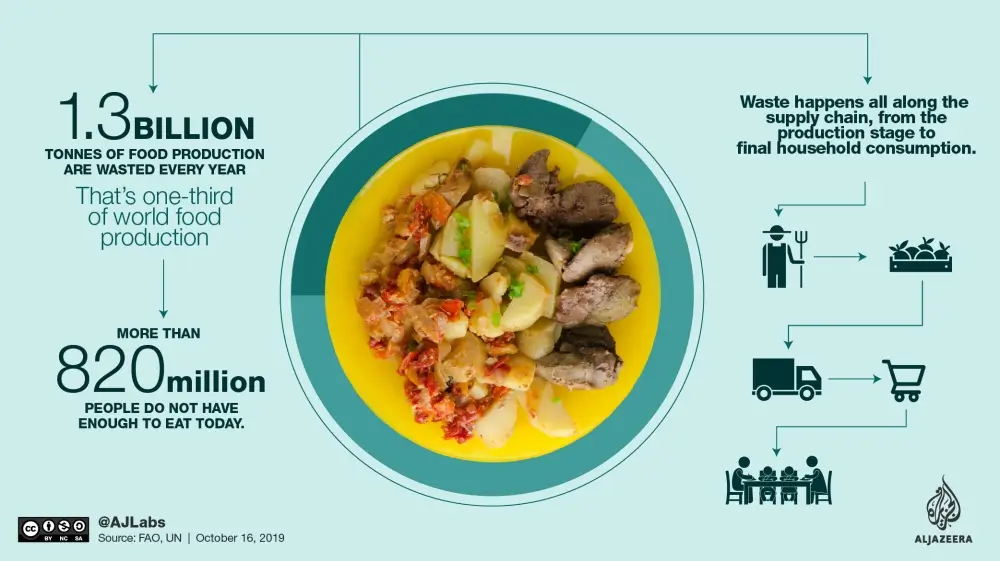
Ways to Prevent Food Waste
Food waste is an environmental issue as well as a social or humanitarian one. We waste not only the food itself, but also the water and energy needed to grow, harvest, transport, and package it. If we cease wasting food, we could cut the 6%–8% of greenhouse gas emissions that are contributed by humans overall. Our goal should be to feed more people while squandering less of what we presently produce, not how to grow more food as the world’s population continues to increase.
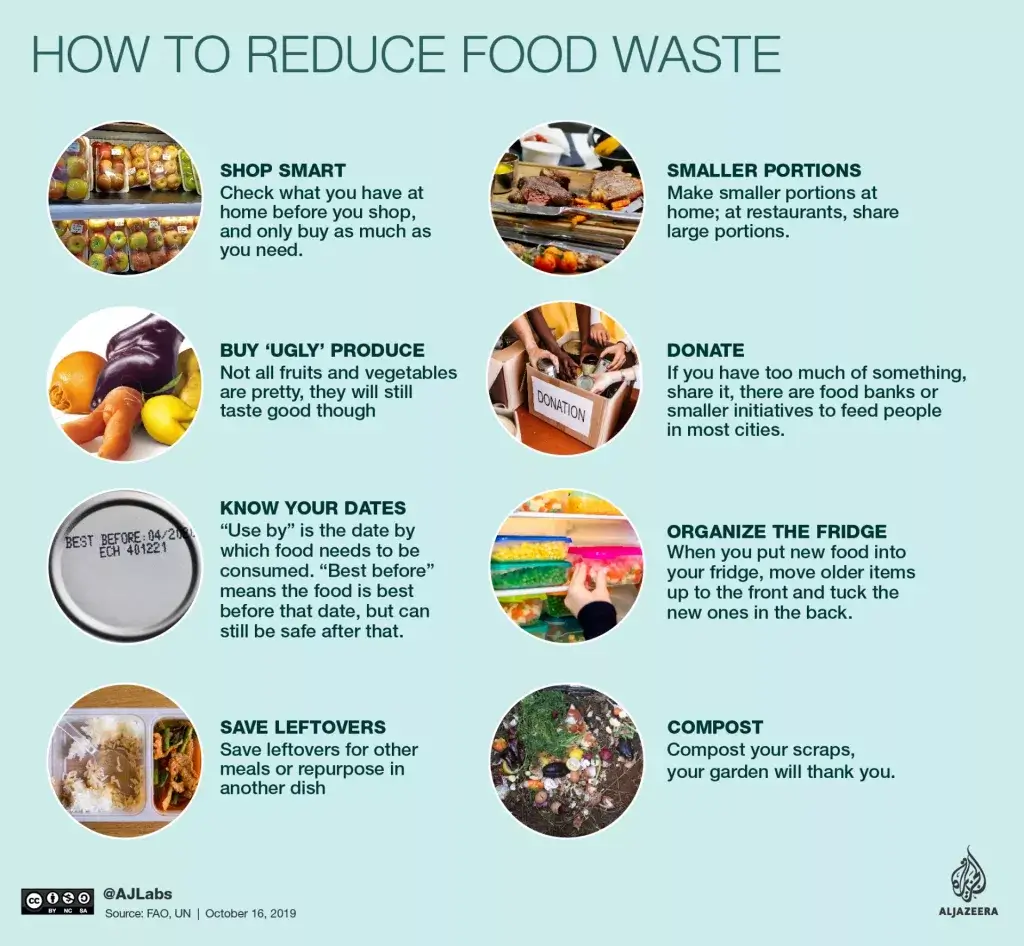
Fortunately, there are many consumer-level activities we can do to significantly impact the situation. We can all make simple changes to reduce our emissions, such as providing leftovers to people in need, freezing food, purchasing more wisely, and composting to keep food scraps out of landfills. There are many ways in which you can contribute to the prevention of food loss and waste. Some of these are as follows:
Shop Smart: Buying food and grocery items in bulk can be convenient but it should be avoided as it leads to wastage of food.
Store Food Properly: Food that shouldn’t be refrigerated includes potatoes, garlic, cucumbers, tomatoes, and onions. If food isn’t stored properly, it will expire.
Preserve Food: Choosing the right method for preserving food is also important as it can help to avoid food loss.
Don’t Stock Up Your Fridge: Do not over stock your fridge and use the ‘first in, first out’ technique. Stocked up food or frozen items for days or months will eventually go to the trash.
Buy Only What You Need: Without a plan or when hungry, going to the supermarket can result in us buying more than we need. Try to eat leftovers, consider meals you could eat out, and prepare your grocery list in advance to prevent impulsive purchases and keep your kitchen organized.
Spread Awareness: Share the “I Value Food” visuals and articles on social media to raise awareness about food waste among your friends, family, students, and coworkers.
Conclusion
Food supply and security are negatively impacted by food loss and waste as a result of population increase. Food loss and waste also raise food prices and jeopardize the viability of the world’s food systems. All the resources such as land, water, labour, energy, and capital used to create the food are wasted when it is lost or wasted. Therefore, it is necessary to take action at all levels to maximize the utilization of the food we produce and reconsider how we eat.
You can also invest in other famous and most in demand housing societies, such as , Blue World City, Rudn Enclave, 7 Wonders City Peshawar, Taj Residencia, Kingdom Valley, New Metro City Gujar Khan, Forest Town Rawalpindi, University Town Rawalpindi, ICHS Town, Park View City Islamabad, Multi Gardens B17 Islamabad and Nova City Islamabad.
Al Sadat Marketing please contact 0331 1110005 or visit https://alsadatmarketing.com/
Few more real estate housing schemes which are trending now a days in Islamabad by including: Faisal Town Phase 2, Prism Town Gujar Khan, New City Paradise, Eighteen Islamabad, 7 Wonders City Islamabad, Capital Smart City, Silver City Islamabad, The Life Residencia, Faisal Town Islamabad, Islamabad Golf City, Islamabad Model Town and Marble Arch Enclave.
Al Sadat Marketing is an emerging Real Estate Agency headquartered in Islamabad, Pakistan. With over 10+ Years of experience, Al Sadat Marketing is providing its services and dealing all trending housing societies projects in different cities of Pakistan. Islamabad Projects, Rawalpindi Projects, Gujar Khan Projects, Burhan Projects, and Peshawar Projects etc.
Book Your Plot Now: +92 331 111 0005







